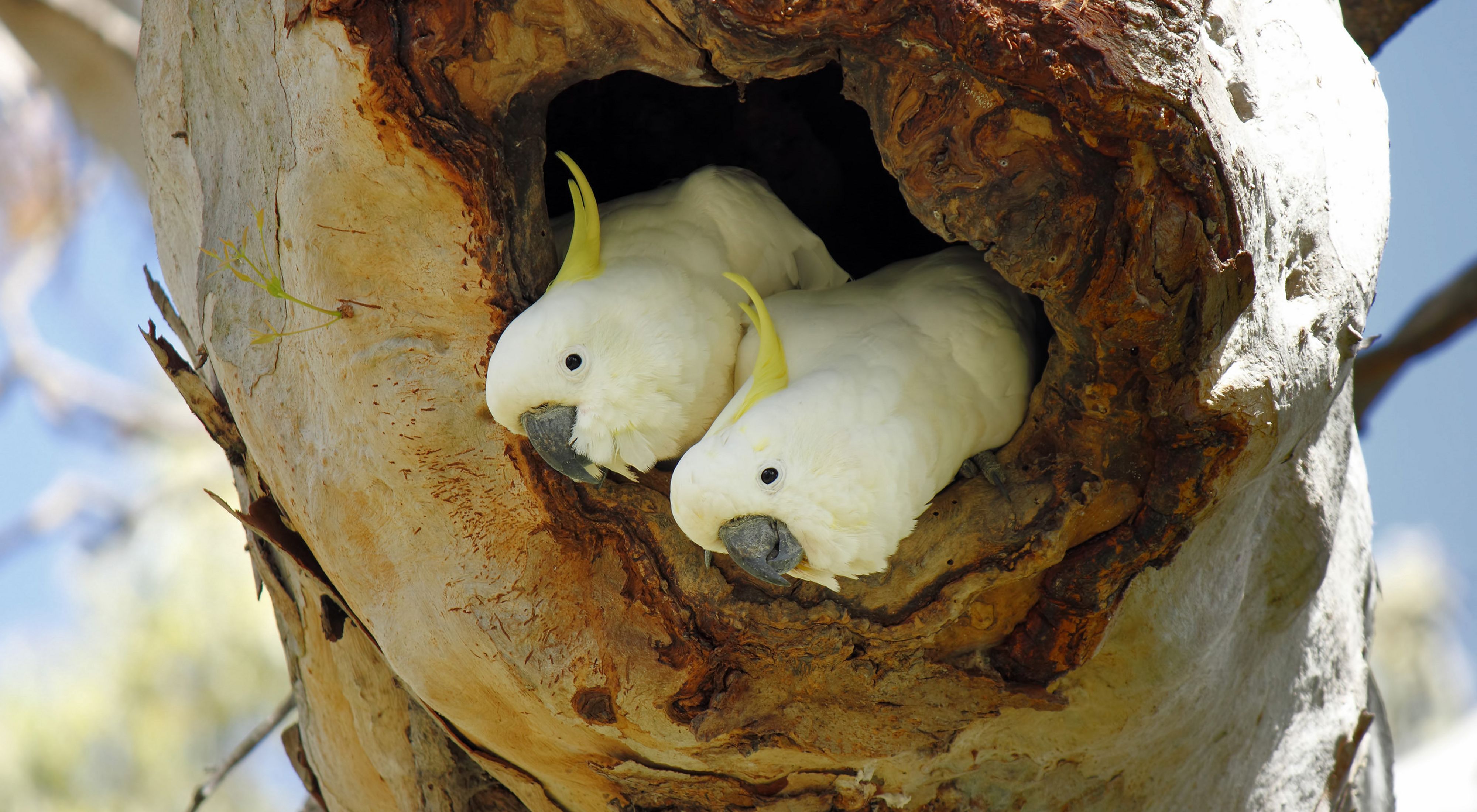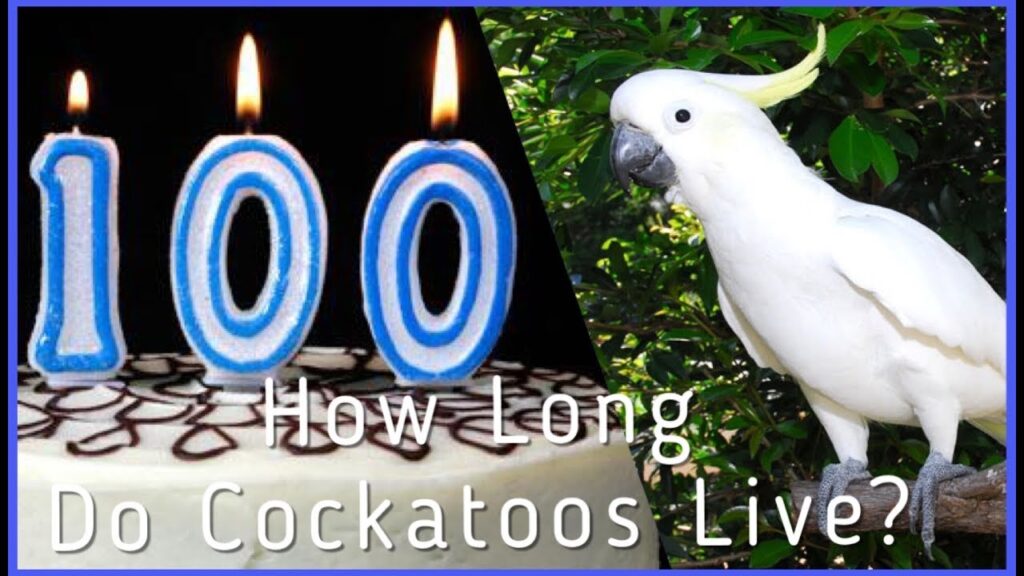Cockatoos can live for 20 to 60 years. Their lifespan varies with species and care quality.
Cockatoos, noted for their sociable nature and striking crest, are a beloved choice among bird enthusiasts. These parrots boast a range of species, each with a distinct lifespan shaped by genetic factors and environmental conditions. Optimal care including a nutritious diet, mental stimulation, and regular veterinary check-ups can extend their life expectancy.
As intelligent birds, they require a committed owner ready to provide long-term companionship and a stimulating environment. Knowing their potential longevity is crucial for prospective cockatoo owners to ensure they are prepared for a lasting commitment to their feathered friend’s health and happiness.

Credit: www.natureaustralia.org.au
The Lifespan Of Cockatoos
Cockatoos are not just pets; they’re lifelong companions. These exquisite parrots have a remarkable longevity. Understanding their lifespan helps us plan for their care. It’s crucial for any prospective bird owner to know just how much of a commitment they’re getting into.
Average Years In Captivity Vs Wild
Lifespan can vary greatly between cockatoos in the wild and those living with humans. In captivity, with proper care, cockatoos can live for an exceptionally long time.
- Cockatoos in captivity often live longer than wild ones due to regular meals, clean water, and no predators.
- Wild cockatoos face threats that can shorten their lives. These include predators, food scarcity, and environmental changes.
| Location | Average Lifespan |
|---|---|
| In Captivity | 40-60 years |
| In the Wild | 20-40 years |
Oldest Recorded Cockatoo
The title of the oldest cockatoo goes to a remarkable bird.
- Cookie, a Major Mitchell’s cockatoo, held the record.
- He lived at the Brookfield Zoo in Chicago.
- Cookie reached an amazing age of 83 years.
- His long life is a testament to the care he received.
Cookie passed away in 2016, leaving behind a legacy and setting a high bar for cockatoo caretakers everywhere.
Factors Affecting Cockatoo Longevity
Cockatoos are known for their charming personalities and long life spans. But what really determines how long these feathered companions will grace us with their presence? Understanding the factors contributing to a cockatoo’s longevity can offer valuable insights. Let’s delve into what influences the life expectancy of these magnificent birds.
Genetics And Species Variations
Just like humans, cockatoos inherit traits from their parents. The genetic makeup plays a crucial role in overall health and lifespan. Among the various species, life expectancies range widely:
- The Galah: typically lives up to 40 years
- The Major Mitchell’s: can live past 60
- The large and hearty Moluccan: often reaches 80 or more
Acknowledging these differences is important for potential owners to understand the lifelong commitment they are making.
Importance Of Diet
Nutritious food profoundly impacts longevity. A balanced diet for a cockatoo includes:
| Food Type | Benefits |
|---|---|
| Seeds and Nuts | Provide essential fats |
| Fruits and Vegetables | Supply vitamins and minerals |
| Pellets | Offer a well-rounded nutrient mix |
Varied and appropriate diets reduce the risk of nutritional deficiencies and related health issues in cockatoos.
Environmental Influences
A cockatoo’s environment can either shorten or extend its life. Key environmental factors include:
- Living Space: Ample and enriched spaces encourage exercise and mental stimulation.
- Climate Control: A stable and comfortable habitat protects from stress and illness.
- Social Interaction: Regular engagement with humans or other birds fosters emotional well-being.
Cockatoos thrive in surroundings that cater to their physical and psychological needs.
Healthcare For Prolonging Life
Thriving for longevity in cockatoos involves dedicated healthcare routines. These majestic birds can live upwards of 40 to 70 years with exceptional care. Proper healthcare routines ensure they live not only longer but healthier lives. Let’s explore the essentials in cockatoo healthcare.
Routine Veterinary Care
Like humans, cockatoos need regular check-ups to stay healthy. A vet specializing in birds is a must. Their sharp eyes can spot early signs of illness, keeping your feathered friend on a path to a long and vibrant life.
- Annual check-ups catch health issues early.
- Blood tests reveal hidden health problems.
- Beak and feather checks prevent discomfort and disease.
Common Health Issues And Prevention
Knowing what ails cockatoos paves the way for prevention. Nutrition and environment play huge roles in their well-being. Let’s delve into preventing common health problems.
| Issue | Prevention Tip |
|---|---|
| Feather picking | Entertain with toys, interaction. |
| Obesity | Monitor diet, encourage exercise. |
| Psittacosis | Keep cage clean, avoid overcrowding. |
| Respiratory issues | Provide fresh air, smoke-free environment. |
Regular exercise and a diet with proper nutrients support immune health and vitality. Avoid exposure to toxins, like certain household cleaners and smoke, to keep their delicate respiratory systems in check.

Credit: birdfact.com
Optimal Diets For Cockatoos
Want your cockatoo to live a long, healthy life? A balanced diet is key. Like us, cockatoos need a variety of foods for health. Let’s explore how to feed them right.
Essential Nutrients And Supplements
Cockatoos sparkle with the right nutrients. Here’s a breakdown:
- Proteins: For feathers and growth. Examples include cooked eggs and lean meats.
- Fats: Give energy. Think seeds and nuts in moderation.
- Vitamins: Vital for body functions. Offer fruits and veggies daily.
- Minerals: For bone health. Cuttlebone and mineral blocks can help.
- Water: Always provide fresh water. Change it daily.
Foods To Avoid For Cockatoos
Some foods are no-nos for cockatoos. Here are the top offenders:
| Food Type | Reason to Avoid |
|---|---|
| Avocado | Contains persin, toxic to birds. |
| Chocolate | Has theobromine, can cause poisoning. |
| Onions/Garlic | Can lead to digestive problems. |
| Caffeine | Stimulant that’s harmful to their system. |
| Alcohol | Poisonous and can be fatal. |
| Salt | Excess salt can affect health. |
The Role Of Exercise And Stimulation
When it comes to the impressive lifespan of cockatoos, which can reach up to 70 years in captivity, the importance of exercise and stimulation cannot be overstated. These vibrant creatures require a combination of physical and mental engagement to maintain their health and extend their longevity. Let’s delve into how providing a stimulating environment for cockatoos can significantly impact their quality of life.
Physical Activities For Cockatoos
Engaging in playtime and regular exercise is crucial for cockatoos. Without it, they can develop both physical and behavioral problems. Fortunately, several activities can keep them active and healthy.
- Flying: If space allows, giving your cockatoo the chance to fly about is ideal for exercise.
- Climbing: Install perches and ladders to encourage climbing, a natural and enjoyable activity for birds.
- Chewable Toys: Cockatoos love to chew, and providing bird-safe toys can help them stay active and engaged.
- Music and Dancing: Many cockatoos enjoy moving to music, which is a delightful way to get them to exercise.
Mental Stimulation And Its Benefits
Mental stimulation is as essential as physical exercise in extending a cockatoo’s lifespan. It helps prevent boredom and the destructive behaviors that often result. Here are benefits and ways to keep a cockatoo’s mind sharp:
| Stimulation Type | Benefits |
|---|---|
| Puzzles and Foraging Toys | Improves problem-solving abilities and replicates natural behaviors. |
| Social Interaction | Strengthens bonds and enhances emotional well-being. |
| New Experiences | Encourages adaptability and reduces anxiety. |
| Training Sessions | Boosts cognitive function and serves as a foundation for discipline. |
Housing Conditions That Enhance Longevity
The lifespan of a cockatoo can soar with the proper housing conditions. Factors like space, comfort, and social interaction crucially impact their health and longevity. Let’s explore how to create an environment that helps these beautiful birds thrive.
Suitable Living Spaces
Size matters for cockatoo cages. A spacious home allows for exercise and play, essential for physical health and mental stimulation. The cage should be large enough for wingspan stretching and vertical movement. It should also be equipped with perches of varying diameters to cater to their grasping needs and keep their feet healthy.
- Minimum Cage Dimensions: For small species, at least 20 x 20 x 36 inches (WxDxH).
- For larger species: Minimum dimensions increase to 36 x 24 x 48 inches.
- Bar Spacing: Keep it appropriate to prevent escape or injury – typically 3/4 to 1 inch.
Proper cage placement also enhances a cockatoo’s life quality. Position the cage in an area free from drafts, not too isolated yet not in the direct line of busy household traffic. Natural lighting and a view of daily activities can keep them engaged and happy.
| Feature | Importance |
|---|---|
| Material | Durable, non-toxic, easy to clean |
| Cleanliness | Regular cleaning prevents disease |
| Enrichment | Toys and puzzles fight boredom |
The Influence Of Social Interaction
Cockatoos are incredibly social birds that need interaction to stay healthy. They bond deeply with their owners and can become depressed if ignored or left alone for long periods. Regular human contact is essential, as it provides stimulation and helps maintain their emotional wellbeing.
Introducing another cockatoo for companionship can be beneficial but requires careful consideration. Birds need to have compatible personalities to cohabitate peacefully. Positive social experiences help prevent behavioral issues and encourage a friendly demeanor.
Practice these social habits:
- Daily interaction and playtime with your cockatoo.
- Training sessions to strengthen bonds and stimulate the mind.
- Observation of behavior to ensure they’re content and healthy.
Remember, the right living space and loving interaction can make the years with your feathery friend many and full of joy.
Breeding And Its Impact On Lifespan
When discussing the lifespan of cockatoos, it’s crucial to consider their breeding habits. Just like with humans, the reproductive journey a cockatoo takes can influence its overall longevity. Various factors interlink breeding with lifespan. These include the frequency of breeding cycles and the age at which these birds first reproduce. Understanding these aspects provides insight into the delicate balance of a cockatoo’s health and vitality.
Breeding Frequency
Breeding frequency refers to how often cockatoos reproduce within a given timeframe. Experts suggest that this frequency can have substantial effects on a cockatoo’s lifespan.
- Frequent breeding may lead to quicker depletion of the bird’s energy and resources.
- A moderate breeding schedule helps in maintaining the parent’s vigor, potentially extending its life.
Age At First Breeding
The age at first breeding also shapes the potential lifespan of these birds. Entering the breeding cycle too early may affect a cockatoo’s growth and health.
| Age | Impact |
|---|---|
| Younger than recommended | Potential to harm both the offspring and the parent’s life expectancy. |
| Optimal breeding age | Promotes healthier offspring and preserves parent’s longevity. |
Credit: www.quora.com
Caring For An Aging Cockatoo
When a cockatoo enters its golden years, the care they require evolves. Understanding the needs of an aging cockatoo is crucial for their wellbeing. This section shines a light on the adjustments needed to provide optimal care for these senior birds, and how to recognize the signs that indicate they are approaching the end of their journey.
Adjustments In Care With Age
Aging cockatoos need special attention to maintain their quality of life. Here are essential care adjustments:
- Soft Foods: Offer easier-to-eat options like soft fruits and vegetables.
- Accessibility: Rearrange cages for easy access to perches and food bowls.
- Low-impact Exercise: Encourage gentle activities to maintain their health without causing strain.
- Health Checks: Increase veterinary visits for early detection of age-related issues.
- Comfort: Ensure a warm, comfortable sleeping area as older birds often feel the cold more.
End-of-life Signs And Symptoms
Identifying end-of-life signs helps in providing compassionate care during a cockatoo’s final days. Watch for these symptoms:
| Sign/Symptom | Description |
|---|---|
| Energy Levels | Notable decrease in activity and interest in surroundings. |
| Appetite Changes | Loss of appetite or sudden disinterest in favorite foods. |
| Behavior Shift | Increased irritability or unusual aggression. |
| Physical Appearance | Changes in feather quality or unexplained weight loss. |
| Respiratory Issues | Difficulty breathing or persistent cough. |
Spotting these signs allows you to adjust their environment and seek vet advice to ease their way. Remember, a cockatoo’s age can span decades, so early and ongoing care is the beacon that leads to a cherished, lengthy companionship.
Legal And Ethical Considerations
Cockatoos are much more than just pets. They join our families for decades. Owners must understand legal and ethical considerations carefully.
Conservation Status
Cockatoos fall under diverse conservation categories. Their survival often hangs in a delicate balance. The International Union for Conservation of Nature (IUCN) monitors cockatoo species. Many have a threatened status. This status affects legal ownership. Trading certain species is illegal. This protects them in their natural habitats. Always check a species’ status before planning to own one.
Implications Of Owning A Long-lived Bird
Owning a cockatoo means a lifetime commitment. These birds can easily live up to 50 or more years. This is as long as many human lifespans. Before owning a cockatoo, consider the following:
- Long-term care: Cockatoos require care for many years. Future life changes can affect this commitment. Plan accordingly.
- Emotional bond: Birds and humans bond deeply. Sudden changes can stress cockatoos.
- Financial responsibility: Their care can be costly. This includes food, vet visits, and toys.
- Ethical breeding: Buy from reputable breeders. They follow ethical breeding practices.
Choosing a cockatoo companion is a serious decision. Research and preparation are key. Remember, you’re committing to a bond that spans decades.
Conclusion
Cockatoos boast impressive lifespans that rival human milestones. Caring for these birds demands commitment—a life filled with enrichment ensures longevity. Remember, a cockatoo’s health and lifespan are deeply influenced by diet, environment, and loving care. Embrace the journey with your feathered friend, nurturing a bond that can last decades.
Choose to be the keeper of time in your cockatoo’s vibrant life.
Ryan Everhart is a passionate bird enthusiast and blogger, primarily writing on his website, Avian Whispers. His journey into the world of bird blogging began with a deep interest in parrots, a species that captivated his attention for their intelligence and social behavior. Over time, his content expanded to cover a broader range of bird species, offering insights into bird behavior, care, habitats, and conservation.
Ryan is dedicated to educating his audience, which includes both new bird owners and seasoned enthusiasts. His writing is filled with personal experiences, expert knowledge, and practical advice on bird care. Through Avian Whispers, he aims to foster a deeper appreciation for birds, emphasizing their role in nature and the joys of having them as pets.
Starting with articles focused on parrots, Ryan’s work now encompasses a diverse range of topics such as feeding, training, habitat enrichment, and bird health. His love for birds extends beyond parrots, diving into various avian species. His informative and heartfelt writing reflects his commitment to the well-being of birds and the desire to help others connect with these creatures.
As a growing voice in the bird blogging community, Ryan strives to provide a platform where bird lovers can learn, share experiences, and connect over a shared passion for avian life. His blogs are not only educational but also serve as a reminder of the importance of protecting and nurturing the bond between humans and birds.



